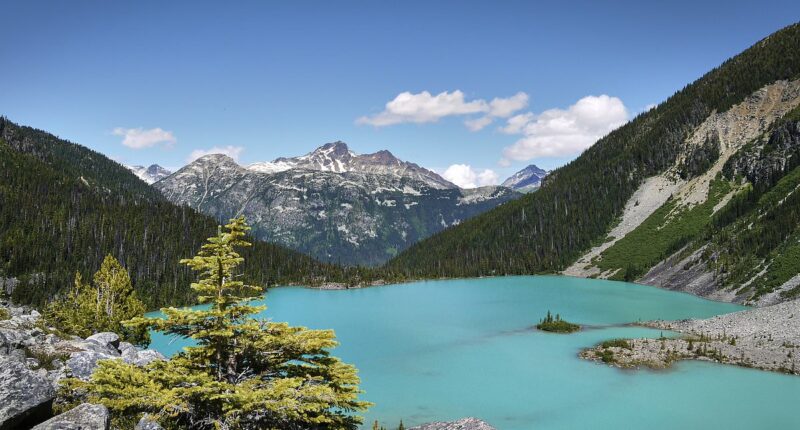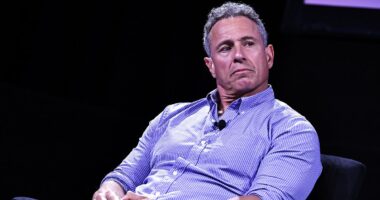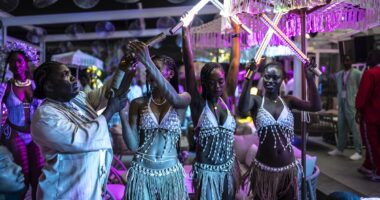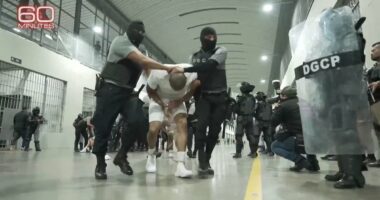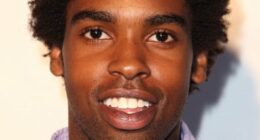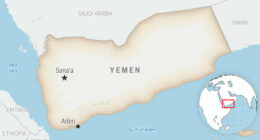Share this @internewscast.com
One of Canada’s most popular provincial parks will be closed to non-Indigenous visitors for a month this fall – but native leaders say the move is a token gesture that falls far short of what they demanded.
British Columbia officials announced that Joffre Lakes Park, a turquoise alpine lake destination about 120 miles north of Vancouver, will be closed from September 2 to October 3 so members of the Lil’wat and N’Quatqua First Nations can ‘reconnect with the land, conduct ceremonies, and gather traditional food and medicines.’
The Nations, whose unceded territories the park covers, had asked for a two-month closure, from August 22 through October 23.
In a joint online statement, they blasted the shorter timeframe as a ‘continuation of colonial decision-making’ and said the approved dates were ‘a fraction’ of what they had proposed.
‘The [closure] does not respect Indigenous authority over our traditional lands,’ the statement said.
The Nations argued their communities needed more time for their activities, as well as to give the heavily trafficked area a ‘rest period from recreational use.’
Dean Nelson, political chief of the Lil’wat Nation, called the decision ‘disappointing and disheartening’ in an interview with CBC
‘This is not reconciliation,’ Nelson said. ‘This is a continuation of colonial decision-making, you know, disregarding our needs and values on the land.’

Joffre Lakes Park, a turquoise alpine lake destination about 120 miles north of Vancouver, will be closed to non-Indigenous people for a month so members of the Lil’wat and N’Quatqua First Nations can ‘reconnect with the land’

First Nations leader say the the monthlong closure is a token gesture that falls far short of what they demanded
He went on to accuse the province of prioritizing outsiders’ enjoyment over Indigenous stewardship.
‘It is still management of, you know, [an] amusement park kind of thing. It is other people’s values that they have to come and, you know, be seen and take their selfies there. So, again, the values are not being honored on an equal level.’
The British Columbia Ministry of Environment defended the schedule, saying it ‘balances cultural practices, conservation goals and public access.’
Officials stressed that the dates ensure the park will remain open during the busy Labor Day long weekend and noted that the park will be closes for a total of 68 days in 2025. That’s up from 60 days in 2024, though still well below the 103 days requested by the Nations.
This summer’s shutdown will mark the third closure of Joffre Lakes this year, following a three-week closure in April and a two-week closure in June.
The closures come amid long-running tension over overuse of the park, which saw more than 180,000 annual visitors before B.C. Parks imposed a free day-pass system in 2021.
To combat crowding, the number of day passes was cut in half last year, from 1,000 to 500 per day.
Canadian nature lovers have already expressed outrage over the government shuttering beauty spots to give exclusive access to indigenous groups.
Outdoors enthusiasts slammed the closure of Joffre Lakes for more than 100 days during peak season, as well as the 24-hour closure of Botanical Beach on Vancouver Island so the Pacheedaht First Nation could use it alone.

The park sits on the First Nations’ unceded territories
Critics on social media branded the closures ‘unfair,’ ‘discriminatory,’ ‘identity politics,’ and even ‘apartheid, Canadian-style.’ One user fumed: ‘These are provincial parks, not tribal reserves. Everyone pays for them. Everyone maintains them. Everyone should be welcome.’
Caroline Elliott, director of the Public Land Use Society, said in a viral video that the Joffre closures were ‘divisive’ and ‘set a terrible precedent.’
‘It’s just plain wrong. What it isn’t is complicated. B.C.’s parks belong to all British Columbians,’ she said.
She also warned that the closures have steadily expanded: 39 days in 2023, 60 days in 2024, and more than 100 this year.
Elliott argued that the Nations’ land rights remain untested in court, saying: ‘The mere assertion of title confers the right to prohibit public access to public spaces. What would prevent more closures like this, not just in other parks, but in relation to any other public lands?’
The Ministry of Environment previously told the Mail the closures are part of a ‘path of reconciliation’ and ‘important to give time and space for the land to rest, while ensuring the Nations can use this space as they always have.’
The debate reflects broader Canadian culture wars, erupting in the wake of Justin Trudeau’s decade of liberal rule and a recent election overshadowed by Donald Trump’s push to make Canada the ’51st state’ of America.
Back in 2023, the Nations unilaterally blocked access to Joffre Lakes without government approval, asserting their Title and Rights over unceded territory.

Indigenous groups say they struggle to access lands on which their ancestors used to hunt and fish

A closure at Botanical Beach park on Vancouver Island and its tidal pools this month also raised concerns

The Ministry of Environment said the closures are part of a ‘path of reconciliation’ and ‘important to give time and space for the land to rest, while ensuring the Nations can use this space as they always have’
At the time, they said they were taking space to ‘harvest and gather our resources within our territories.’
Nelson stressed then that the park was sacred: ‘We are striving to reintroduce our community to an area where they have been marginalized.
‘The time and space created by these closures will allow our youth, elders and all Lil’wat citizens to practice their inherent rights while reconnecting with the land.’
Similar disputes have also flared elsewhere: the Botanical Beach closure this year, as well as restrictions in Gulf Islands National Park Reserve and Pacific Rim National Park Reserve.
